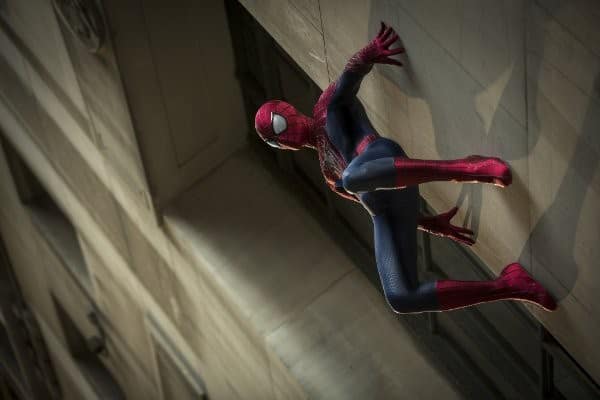The Splash Page: Spider-Man has left the Marvel Universe

Photo courtesy of Rotten Tomatoes
September 6, 2019
The year is 2022. “Venom v. Spider-Man: Dawn of Carnage” is swinging into theaters next week, and to the casual viewer, this might seem like just next the next big team-up of two Marvel Comics properties, starring Tom Holland’s Spider-Man, now perhaps the most familiar and well-explored version of the character on screen yet.
And yet, this isn’t the Spider-Man you know. His friend Happy Hogan, formerly Tony Stark’s bodyguard, is gone from his supporting cast. There will be no follow-up to the big post-credits scene of 2019’s “Spider-Man: Far From Home.” In fact, there will be no follow-up to the question of whether Spider-Man will live up to the legacy of Iron Man, no mention of his time in space, no mention, even, of his five-year disappearance between “Avengers: Infinity War” and “Avengers: Endgame.” Instead, there will be Tom Hardy’s twitchy version of Venom.
And, in the other films of Marvel’s stunningly successful universe, there will no longer be a Spider-Man. Perhaps the recently announced Ms. Marvel series will fill the void of teenaged adventuring. Perhaps the massive cliffhanger at the end of “Far From Home” can be assumed to be an ending for the character, at least in his current state. The fact of the matter is, Spider-Man might as well be gone for good, and not because the story was ready to let him go.
There have been various reasons put forward for the very public breakup of Marvel and Sony, who acquired the film rights to the character way back in 1999 and haven’t given up making movies since, now setting them in at least four separate universes. After the absolute failure of “The Amazing Spider-Man 2,” which was meant to lead into a Spidey-based cinematic universe belonging to Sony alone, the rights were shared with Disney and Marvel, and Spider-Man came home in 2015’s “Captain America: Civil War.” Fans and audiences reacted well, and Spider-Man quickly became an important part of the franchise, serving as a key character in the last two “Avengers” films.
And yet, Sony has been pushing away with their own little universe, releasing perhaps the weirdest superhero movie of recent years in “Venom” and the Oscar-winning animated feature “Spider-Man: Into the Spider-Verse,” both unconnected to the MCU. Now it seems that their “Sony’s Universe of Marvel Characters” (yes, the SUMC) is alive and well. Perhaps we’ll even get that rumored Aunt May movie from a few years back! And you, the moviegoer of 2022, you are expected by the Suits at Sony to be happy – overjoyed, in fact – to receive the cinematic gift of Venom threatening to turn Spider-Man into a wind-blown turd. Except, you won’t be, because Spider-Man works best in a shared universe.
The core of Spider-Man, whether it be Peter Parker or Miles Morales or any others who have worn the mask over the years, is that with great power, there comes great responsibility. And, of course, you can make a movie about Peter learning that he’s the first and only superhero. It’s been done twice, in Sam Raimi’s original “Spider-Man” trilogy and Marc Webb’s “Amazing Spider-Man” series. But the most recent version of Spider-Man works because, nestled right up in his core next to the whole Power and Responsibility speech is that Spider-Man is a screw-up. He makes mistakes and he tries to fix them. That’s why some of his greatest villains are connected to him in some way, because the best Spider-Man stories are ones where defeating the villain is his responsibility, not because of his power, but because of his own mistakes. The responsibility doesn’t come from having the power; instead, the power comes from the weight of the responsibility.
And that Spider-Man works best when he’s not the most powerful person in the world. He is a screw-up, he’s up against more than he can handle, and he really should get Iron Man or Thor or Captain America to help him, but he doesn’t, because the villain is a mistake he made, and the problem is one he ought to clean up. Spider-Man is fundamentally an underdog, a scrawny kid you can’t help but cheer for when he gets out from the pile of rubble. Setting him in a world of more powerful heroes, more accomplished Avengers, makes him feel like the friendly neighborhood Spider-Man who has to step up to the big plate – in fact, that’s exactly the argument Peter lets persuade him in Marvel’s “Spider-Man: Far From Home.”
In 2022, after “Venom v. Spider-Man: Dawn of Carnage,” or whatever the inevitable team-up is called, I’ll be happy to judge the sort-of-new Spider-Man on its own merits. I’ll be rooting for it, even. But I’ll be missing something that Sony can’t give the character on their own – I’ll be missing a world where Spider-Man is just living in my neighborhood, where any kid could be Peter Parker, where he’s looking up at the sky and watching Thor fly past, almost as removed as I am from my theatre seat, where the world of superheroes and supervillains comes down to whether or not you need to clean up your mistakes. There’s something more universal there, in doing something because you’ve got to, in blaming yourself even when the problem isn’t even really your fault. That version of Spider-Man only really works when he could be an Avenger, but feels like he can’t.




















